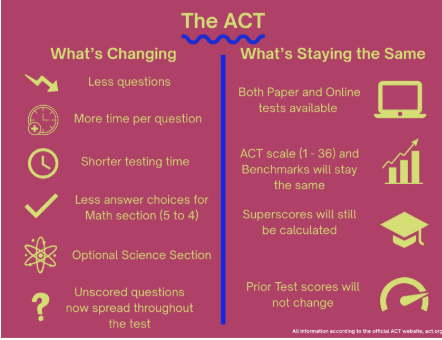In an effort to improve standardized tests, the ACT made valuable changes that promise better student testing experiences.
The ACT, a popular test colleges use for admissions, used to be almost three and a half hours long. The new, enhanced version of this test will reduce the testing time down to a little over two hours.
“The fact that the old ACT was three and a half hours was genuinely just crazy to me,” Akshaya Para ‘26 said. “I just could not focus for that long.”
In order to cut down the total time, the adjustment will also reduce the number of questions in the Reading, Math, and English sections, with the Science and Writing sections now optional. These changes will increase the time per question students will have. Some Berlin students are enthusiastic about this change.
“I’m definitely hopeful now because it’s changed… I’m hoping it’ll be easier for me to complete the questions in time when I take the test,” Ameya Pramod ‘28 said.
In addition to the shorter test, the ACT will now allow unscored questions to be dispersed throughout the test, in order to help the ACT test new questions. These questions will not count towards the final score, and will only be used by the ACT for future development.
However, with the removal of the Science section, some concerns about the dependability of the ACT arise, especially because many colleges across the United States now made their applications test optional.
“Even though they’re taking out questions and making it easier, it’s still a good part of the college application because there’s so many parts of it so it doesn’t really rule out the ACT’s credibility,” Miles King ‘26 said.
The main reason the ACT changed the format of its test was to be more receptive to student’s struggles, in an effort to help students reduce stress.
According to the ACT’s official website, act.org, “The enhanced ACT is designed to reduce pressure, give you more control, and support your college goals — without sacrificing what colleges expect.”
The students at Berlin have jobs, sports, clubs, and other responsibilities along with their academics. These standardized tests can dump more stress on students, something that teachers see quite often.
“Teachers watch a lot of our students trying to manage heavy workloads,” Samantha Kigar , an OBHS guidance counselor, said, “Anything that takes stuff off of your plate, your teachers are going to be happy about.”
With this, an important continuity to note is the Superscoring policy. The Superscore is a composite score created by the ACT with the highest scores from each section across multiple test dates. Superscores will continue to be calculated, but it will now only be based on the English, Reading, and Math sections, regardless of whether the highest scores come from the old ACT or the new version. The Science section will not factor into the superscore anymore, but a separate score report for that section will still be given.
These changes, which started for the online tests in April, will be available for the paper tests from September 2025. Juniors at OBHS are automatically signed up to take the ACT in the Spring of 2026.
*Story continued in October ’25 Bulletin






